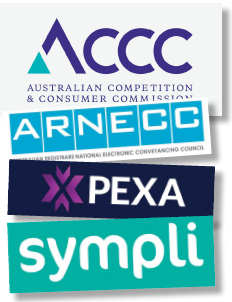What now for competition in e-conveyancing?
The ACCC is inquiring into concerns over delays to the reforms that would open up the e-conveyancing platform to competitors.

A cloud hangs over the interoperability rollout as competition regulators assess whether the PEXA monopoly is acting anti-competitively.
The Australian Competition and Consumer Commission is inquiring into concerns that PEXA may be engaging in anti-competitive conduct, including by allegedly delaying the reforms that would open up the e-conveyancing platform to competitors.
“I wouldn’t characterise it as an in-depth investigation at this stage, but naturally the concerns warrant further consideration,” ACCC executive general manager of competition, Melinda McDonald, told a Senate committee last month.
“We’re still in the process of gathering relevant information.”
PEXA became wholly privately owned in 2019 when states sold off their interests in the company. The Commonwealth Bank-banked firm today has a near monopoly over Australia’s eConveyancing market.
As yet, rival company Sympli – a joint venture between legal software provider ATI Global Limited and ASX Ltd – cannot operate seamlessly within the existing network platform.
At the November 21 Senate hearing, ACCC chair Gina Cass-Gottlieb criticised the way in which PEXA was privatised, making it a monopoly without the necessary robust regulations in place.
“A set of decisions by state and territory governments put together what had been government sole providers into a privatised monopoly without a sufficiently clear and regulatory framework, and that is one which required interoperability as a condition in effect of the transfer of that ownership,” she said.
“The state and territory registries also have not had the sort of background in an enforcement skill and craft sense.
“We can see challenges in that framework. It is a key matter where we have engaged with the national competition review and we know this is being considered carefully at the (national competition) taskforce. Before there is a privatisation that confers a private new monopoly, it is very important to have sufficient regulatory framework.”
Industry regulator ARNECC, which includes registrars from all states and territories, had been leading the reform to deliver full competition in digital settlements by December 2025.
However in June, ARNECC paused the reform program, saying issues raised by the banks were “beyond the remit of state and territories to resolve”. The regulator said it would raise the challenges with the federal government and regulators.
It has emerged since that PEXA reportedly wrote a letter to ARNECC threatening legal action if it was forced to share information about its systems that would allow for greater competition, claiming intellectual property.
“When the interoperability framework was initially established, its scope was defined in a way that did not raise concerns about the protection of PEXA’s intellectual property. This scope was expanded at the request of Sympli,” a PEXA spokeswoman told Australian Conveyancer magazine.
“Details of the expanded scope were not clearly defined by ARNECC, nor was there a clear process outlined to achieve interoperability without risking PEXA’s intellectual property.
“Our letter to ARNECC was written in this context, and we engaged across government, industry, and regulators to explore how the program could reconcile with our intellectual property rights.”

The spokeswoman said PEXA is now seeking clarity from regulators about the implications for the currently regulated December 2025 deadline.
“We have consistently raised concerns with the industry regulator ARNECC and governments regarding the unintended consequences of the proposed approach to introducing interoperability,” she said.
“”Those concerns, which arise from unintended impacts on users’ business processes, uncertainty of scope, unrealistic timeframes and the additional risks and vulnerabilities that would have been introduced into Australia’s critical digital settlements system, have been voiced by other industry participants, including the major banks.”
PEXA has not yet received any inquiries from the ACCC regarding an investigation, but remains committed to collaborating with the ACCC, ARNECC, state registrars, and relevant stakeholders on competition reform, the spokeswoman added.
Meanwhile, conveyancers are demanding more progress on the reforms, saying smaller conveyancing firms are feeling the squeeze under the current monopoly arrangement.
Philip Joyce, the CEO of rival company Sympli, accuses PEXA of a “blatant abuse of market power”.

“In my 30 years I’ve not seen a business threaten to sue a regulator that gives them their license to operate. It’s about protecting their position, rather than enabling the reform that will open up the benefits of competition for consumers and small businesses,” he said.
“That really is the call to action to government and other industry figures to really push to get this reform back into execution.”
Mr Joyce said the challenge was in how to ensure PEXA remained accountable so the banks could gain the information they needed for the reforms.
“The incumbent has used some pretty robust disinformation campaigns with the bank, so I think that’s probably the biggest obstacle at the moment.”
Mr Joyce said Sympli is keenly awaiting a Queensland government review of the reforms, so the industry has clarity on the next steps forward.
“We are expecting the review will confirm that the program will recommence still with deliverables by December 2025,” Mr Joyce said.
“We welcome further government intervention to deliver competition. It’s clear it’s not going to happen willingly from the incumbent. Surely every market participant can see this is not a healthy competitive market.”
Meanwhile, Queensland Natural Resources Minister Dale Last said the state is committed to competition in eConveyancing, and is working with the NSW government on a solution.
“The Crisafulli Government recognises the important role competition plays in guaranteeing value for home buyers and driving down cost of living pressures for Queenslanders,” he said.
“ARNECC receives updates as work progresses, including the outcomes of an interim review undertaken by Titles Queensland with support from the NSW Office of the Registrar-General.
Mr Last said the timeline for re-starting the implementation of the interoperability program will be a key matter for upcoming discussions with ARNECC.

ARNECC’s chair was unavailable for comment. In its latest statement in September, ARNECC said significant issues raised by the banking industry meant the reform faced “significant challenges”.
As such, ARNECC had paused the design, build and test working groups for the interoperability program and stood down its project team, while individual states continue to consider the issues.
The regulator said it would continue to monitor developments as NSW and Queensland undertake work in this space, as the two states scheduled to implement interoperability first.
An Australian Productivity Commission report on national competition policy, released on November 29, said more competition in e-conveyancing could significantly reduce the cost of e-conveyancing services, leading to lower prices of $8 to $15 per transaction.
An ACCC spokesman said it remains of the view that ARNECC as industry regulator, is best placed to consider, assess and address any concerns about the interoperability reform process.
Editor’s note: The Australian Conveyancer is powered by triSearch but maintains editorial independence. triSearch is owned by ATI Global, which also has shares in Sympli.




